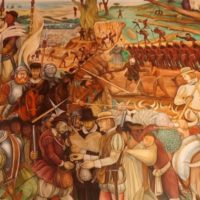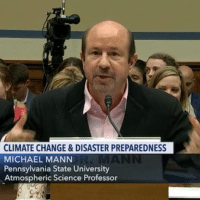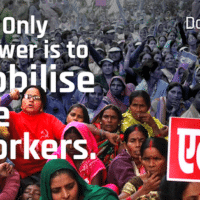-
Frantz Fanon against Facebook: how to decolonize your digital-mind
From the Algeria to algorithms, Lizzie O’Shea argues that Frantz Fanon’s ideas have much to offer us as we seek to understand, and resist, some of the most profound challenges of living in the digital age.
-
Snow queen and Bremen hopes
In late June, some 5000 protestors camped out, as part of the “Stop Air Base Ramstein Campaign,” drawing attention to Germany’s increasing militarization via NATO. They demanded the U.S. Army base at Ramstein—where the top generals direct troop movements in Africa and the Near East, and deploy drones to murder anyone the Pentagon decides is an enemy—be shut down.
-
The city vs. Big Tech
The battle against Big Tech has now decisively emerged as a new front in the fight for the right to the city
-
A new theory of strikes for a new labour movement
Links International Journal of Socialist Renewal reposted from Progress in Political Economy — The idea of mass strikes within the Marxist tradition has been most powerful against capitalism. With the idea of strikes, Marx wants to bring about an epistemological change in the working class, “so they would know that they are, together, ‘the agent of production’, and that if they stopped, then production stopped.” Different models of mass strikes have been practised and reterritorialised worldwide from its origins in Western Europe. There has been debate on how the working class today responds to the current changes of capitalist development.
-
Amid crisis and sanctions, LGBTI activists continue to demand change
One of the sectors hardest hit by Venezuela’s economic crisis is the nation’s LGBTI community. Lacking access to life-saving medicines and denied certain rights, activists say there is still much to be done within the revolution.
-
Why Trump caved to China and Huawei
Everything about the trade war between the United States and China is bewildering. Truces would come out of nowhere but then they would be set aside by U.S. President Donald Trump in a stream of tweets at odd hours. Regardless, Huawei and China are unlikely to blink. They have the upper hand.
-
Should universities care about the truth?
Those with responsibility for the strategic direction of universities have a clear choice in this matter. They can embrace the funding and accolades that come from saying things the Government and other funders want to hear; or they can do what most ordinary people think universities are supposed to do.
-
Warning to progressive Dems: you’re leaving corporate media’s comfort zone
After the first round of Democratic primary debates, the line from corporate media and their overwhelmingly centrist sources was clear: The Democrats are moving dangerously to the left, at their own peril.
-
The Dialectics of Art
In any event the dialectics of art will continue.
-
Inequality metrics and the question of power
How should we measure inequality?
-
Growing old in America: Baby Boomer nightmare
Despite its reputation as the wealthiest generation, baby boomers (generally considered to be those born between 1946 and 1964) are facing a retirement nightmare.
-
Whose history? Why the People’s History Museum is vital
In recent months, high-profile figures have claimed museums should be ‘neutral’ spaces. Thank goodness, then, for the People’s History Museum, writes Danielle Child
-
Himalayan glaciers retreating fast: Cold War spy satellites helped find the fact
Glacier melt in the Himalayas today is twice as fast as it was before 2000. With conditions remaining unchanged, the glaciers are likely to lose two-thirds of their total ice.
-
Daniel Clawson ¡Presente!
Dan was a strong supporter of Labor Notes because it reflected his vision of social transformation, and it was his interest in Labor Notes that prompted him to then join Solidarity.
-
Policing in the Anthropocene
How will the police respond to environmental direct action groups like Extinction Rebellion as climate breakdown reaches critical mass?
-
The debate over inequality
The debate over inequality has become hotter world-wide. While Trump had introduced substantial tax cuts for the rich in 2017, and Britain’s Boris Johnson, the front-runner to succeed Teresa May, has promised to do the same if he becomes Prime Minister, there are strong proposals for taxing the rich which have also been mooted. Bernie Sanders had such a proposal for the U.S. during the time that he was seeking the Presidential nomination of the Democratic Party.
-
Freedom and slavery: the birth of capital
We are frequently told that capitalism equals ‘freedom’; that it is the organic product of ‘human nature’. But far from arising naturally, the birth of the ‘free’ market is built on violence, dispossession, and enslavement.
-
Oral opening statement from Michael Mann testimony to U.S. House Oversight Committee hearing on climate change & natural disasters
And I would also like to emphasize that we’re using the term “natural disasters” but in many cases there is absolutely nothing natural about the disasters we are talking about. We’re not saying they have been caused by climate change, we’re saying that it has worsened them. That’s what the research shows.
-
Religion is the sigh of the oppressed creature
On the one hand, people who spend most of their time working develop an understanding of the ‘practical transformation of the world’. This framework is implicit in the workers’ activity, since the worker–given the theft of their time–is often prevented from having a ‘clear theoretical consciousness of this practical activity’.
-
How working-class movements are moving beyond the confines of capitalism
The context for organizing today that faces working people across the world is one that must grapple with the challenges posed by a decentralized production process and a well-organized ruling class.




















